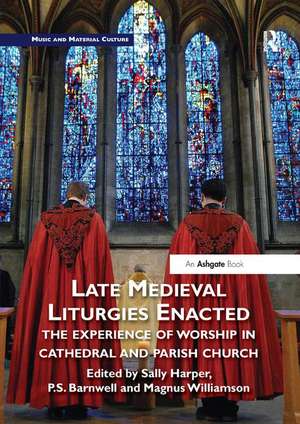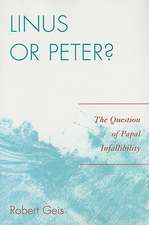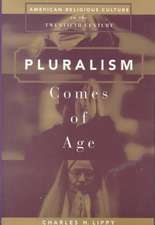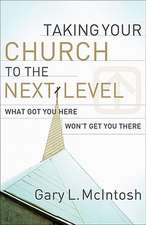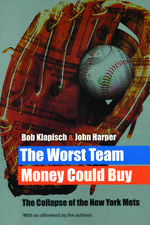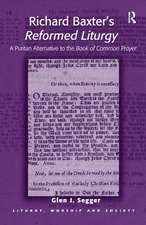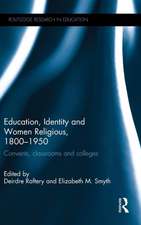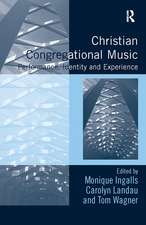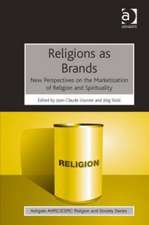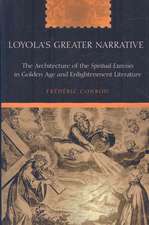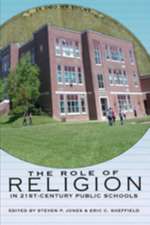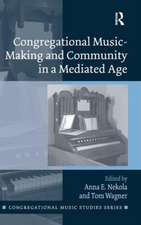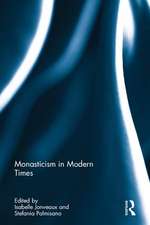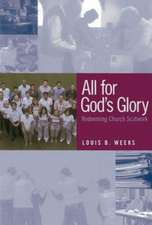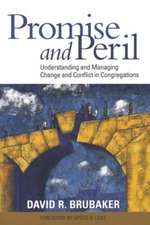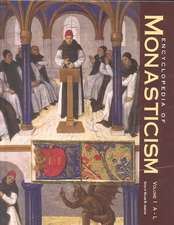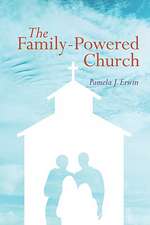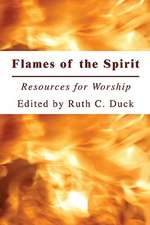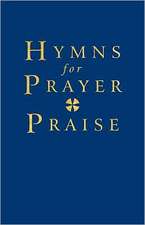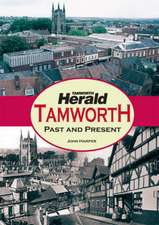Late Medieval Liturgies Enacted: The Experience of Worship in Cathedral and Parish Church: Music and Material Culture
Editat de Sally Harper, P Barnwell, Magnus Williamsonen Limba Engleză Paperback – 7 mar 2019
| Toate formatele și edițiile | Preț | Express |
|---|---|---|
| Paperback (1) | 400.13 lei 6-8 săpt. | |
| Taylor & Francis – 7 mar 2019 | 400.13 lei 6-8 săpt. | |
| Hardback (1) | 1073.65 lei 6-8 săpt. | |
| Taylor & Francis – 15 ian 2016 | 1073.65 lei 6-8 săpt. |
Preț: 400.13 lei
Nou
Puncte Express: 600
Preț estimativ în valută:
76.58€ • 79.65$ • 63.22£
76.58€ • 79.65$ • 63.22£
Carte tipărită la comandă
Livrare economică 14-28 aprilie
Preluare comenzi: 021 569.72.76
Specificații
ISBN-13: 9780367202415
ISBN-10: 0367202417
Pagini: 392
Dimensiuni: 174 x 246 x 21 mm
Greutate: 0.7 kg
Ediția:1
Editura: Taylor & Francis
Colecția Routledge
Seria Music and Material Culture
Locul publicării:Oxford, United Kingdom
ISBN-10: 0367202417
Pagini: 392
Dimensiuni: 174 x 246 x 21 mm
Greutate: 0.7 kg
Ediția:1
Editura: Taylor & Francis
Colecția Routledge
Seria Music and Material Culture
Locul publicării:Oxford, United Kingdom
Public țintă
Postgraduate and UndergraduateCuprins
Introduction John Harper
Part 1: Investigating the Experience of Late Medieval Worship in Medieval Church Buildings
1. Investigating the Experience of Late Medieval Worship John Harper
2. Enacting Late Medieval Worship: Locations, Processes and Outcomes John Harper
Part 2: Past Evidence and Present Realisation
3. The Church of St Teilo, Llandeilo Tal-y-bont – A Moving Story Gerallt Nash
4. Clothing the Space: Making and Using the Artefacts and Vestments Sally Harper
5. A New Pre-Reformation Organ for the Church of St Teilo Dominic Gwynn
6. Establishing a Liturgical ‘Text’: Text for Performance, Performance as Text Matthew Cheung Salisbury
7. How Did They Do Liturgy? Preparing Late Medieval Text for Modern Enactment Sally Harper and John Harper
8. Quadring Cows: Resourcing Music in the Pre-Reformation Parish Magnus Williamson
Part 3: Historical Foundations – Three Case Studies
9. The Reform of the Choir of Salisbury Cathedral, c.1450–1549 Roger Bowers
10. The Musical Knowledge and Practice of Expert Tudor Descanters Jane Flynn
11. The Holy Name of Jesus: A Literate Cult? Judith Aveling
Part 4: Medieval Liturgy and Modern Enactment
12. The Nature of Late Medieval Worship: The Mass P. S. Barnwell
13. The Celebrant Reflects: Theological and Spiritual Priorities expressed through Sarum Use Jeremy Davies
14. Enabling the Ritual: Aspects of the Experience of Assisting Clergy, Servers, Singers and Organ-Player John Harper
15. How to do Without Rubrics: Experiments in Reconstructing Medieval Lay Experience P. S. Barnwell
16. Reflections on the Enactments: Voices from the Nave Keith Beasley, Judith Aveling and John Francis Moss
Part 5: Reflecting on Present Experience of Past Rituals
17. Reconciling the Historical and the Contemporary in Liturgical Enactment Nils Holger Petersen
18. The Ritual Enactments: Historical Validity, Measurable Outcomes, Experience and Engagement John Harper
19. Enactment and the Study of Late Medieval Liturgy John Harper
Appendices
A.1 Summary Narrative of Mass of the Day in Choir
A.2 Summary narrative of simple sung Mass with priest, server and singers
A.3 Plan of Salisbury Cathedral
A.4 Plan of St Teilo’s Church.
Bibliography
Index
Part 1: Investigating the Experience of Late Medieval Worship in Medieval Church Buildings
1. Investigating the Experience of Late Medieval Worship John Harper
2. Enacting Late Medieval Worship: Locations, Processes and Outcomes John Harper
Part 2: Past Evidence and Present Realisation
3. The Church of St Teilo, Llandeilo Tal-y-bont – A Moving Story Gerallt Nash
4. Clothing the Space: Making and Using the Artefacts and Vestments Sally Harper
5. A New Pre-Reformation Organ for the Church of St Teilo Dominic Gwynn
6. Establishing a Liturgical ‘Text’: Text for Performance, Performance as Text Matthew Cheung Salisbury
7. How Did They Do Liturgy? Preparing Late Medieval Text for Modern Enactment Sally Harper and John Harper
8. Quadring Cows: Resourcing Music in the Pre-Reformation Parish Magnus Williamson
Part 3: Historical Foundations – Three Case Studies
9. The Reform of the Choir of Salisbury Cathedral, c.1450–1549 Roger Bowers
10. The Musical Knowledge and Practice of Expert Tudor Descanters Jane Flynn
11. The Holy Name of Jesus: A Literate Cult? Judith Aveling
Part 4: Medieval Liturgy and Modern Enactment
12. The Nature of Late Medieval Worship: The Mass P. S. Barnwell
13. The Celebrant Reflects: Theological and Spiritual Priorities expressed through Sarum Use Jeremy Davies
14. Enabling the Ritual: Aspects of the Experience of Assisting Clergy, Servers, Singers and Organ-Player John Harper
15. How to do Without Rubrics: Experiments in Reconstructing Medieval Lay Experience P. S. Barnwell
16. Reflections on the Enactments: Voices from the Nave Keith Beasley, Judith Aveling and John Francis Moss
Part 5: Reflecting on Present Experience of Past Rituals
17. Reconciling the Historical and the Contemporary in Liturgical Enactment Nils Holger Petersen
18. The Ritual Enactments: Historical Validity, Measurable Outcomes, Experience and Engagement John Harper
19. Enactment and the Study of Late Medieval Liturgy John Harper
Appendices
A.1 Summary Narrative of Mass of the Day in Choir
A.2 Summary narrative of simple sung Mass with priest, server and singers
A.3 Plan of Salisbury Cathedral
A.4 Plan of St Teilo’s Church.
Bibliography
Index
Recenzii
"…a valuable overview of the logistics of medieval worship and of the ways that it may have been experienced by participants, both clergy and laity". Madeleine Gray, University of South Wales, in Archaeologia Cambrensis.
"This book is as strong in describing the research methods used as in the detailed information that it presents. (...) This volume is highly specialised, but can be recommended to anyone interested in music and liturgy and the world of the late medieval Church in England and Wales." - Robert Manning, The Consort Early Music Journal, vol.73, Summer 2017
"This substantial book is beautifully produced with numerous colour and black-and-white photographs and is very comprehensive. It fills a large gap in our knowledge." - Peter Freeman, Anglo-Catholic History Society
"This book is as strong in describing the research methods used as in the detailed information that it presents. (...) This volume is highly specialised, but can be recommended to anyone interested in music and liturgy and the world of the late medieval Church in England and Wales." - Robert Manning, The Consort Early Music Journal, vol.73, Summer 2017
"This substantial book is beautifully produced with numerous colour and black-and-white photographs and is very comprehensive. It fills a large gap in our knowledge." - Peter Freeman, Anglo-Catholic History Society
Descriere
This book critically explores ways in which our understanding of late medieval liturgy can be enhanced through present-day enactment. Discussion of the processes of the enactments is complemented by contextual studies, with particular emphasis on the provision of music. A distinctive feature of the work is that it seeks to understand the experiences of different groups within the medieval church - the clergy, their assistants, the singers, and the laity.
